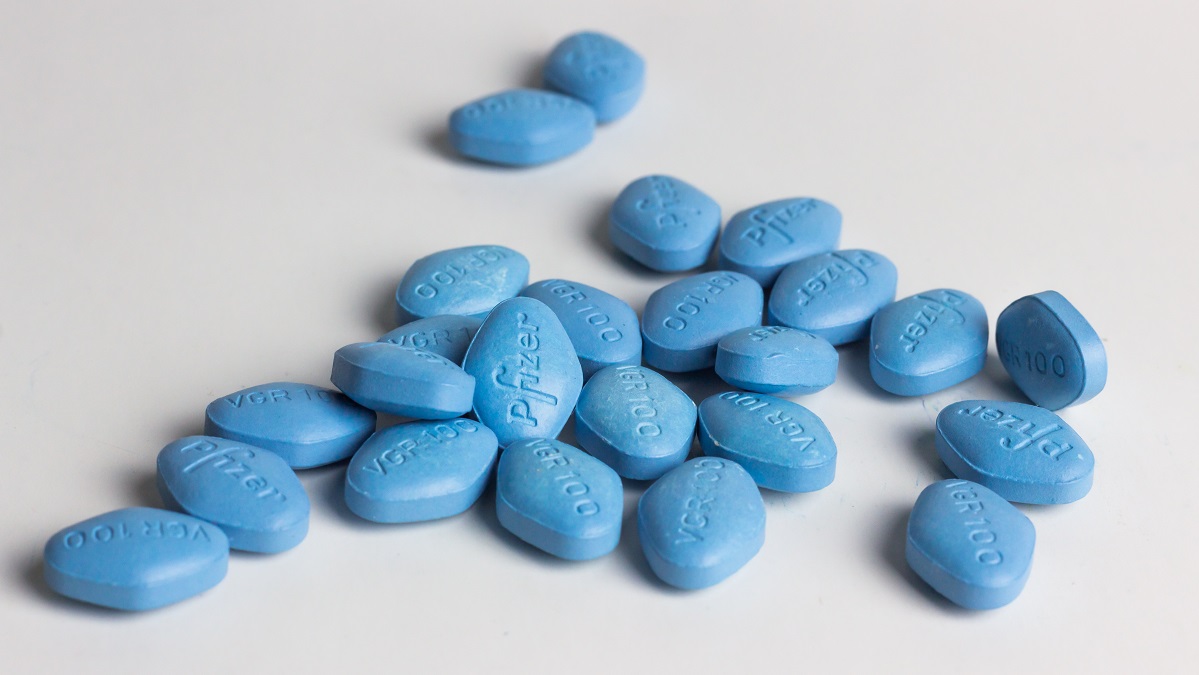The little blue pill helping men in the bedroom could also be saving their hearts, according to several studies into the effects of Viagra on heart health.
The link between drugs that treat impotence, such as Viagra, and improved cardiovascular health has been previously established, but the results of a new investigation further strengthen this link.
In a study published in The Journal of Sexual Medicine, pharmaceutical company Sanofi examined 14 years of medical records involving 23,000 men who had been prescribed a phosphodiesterase type 5 inhibitor (PDE-5i) – such as Viagra – and compared them the records of 48,000 men who had not been prescribed those drugs.
The results showed men taking PDE-5i medication are 39 per cent less likely to die from cardiovascular disease than those who have never taken it.
They were also 25 per cent less likely to die from any cause, and 13 per cent less likely to have a cardiac event, such as a heart attack or stroke.
The dosage of Viagra also seemed to make a difference, with men prescribed a higher dose better protected than those taking a lower dose.
“Phosphodiesterase type 5 inhibitors are not only safe but may have important cardioprotective properties,” the report’s authors said.
“[These findings] suggest an urgent need for an adequately powered, prospective randomised placebo-controlled trial.”
The results support an earlier study, which found men suffering from coronary artery disease who were also prescribed Viagra lived longer and had a reduced risk of a further heart attack.
The Swedish study, published in the Journal of the American College of Cardiology (JACC), says observed benefits in men with coronary artery disease (CAD) is “intriguing but still insufficient to support any change in clinical practice”.
Read: Heart issues a bigger problem for women than men
The journal says more efforts are needed to study the effects of such drugs in women, where the association between the function of female erectile tissues and cardiovascular events is less understood. (Read a summary of the current understanding of women and Viagra here.)
And a randomised placebo-controlled trial is required for men.
However, experts speculate encouraging associations are found because drugs such as sildenafil reduce blood pressure, which is a strong risk factor for heart disease.
And concerns over sexual performance can prove life-saving.
Read: How you could be doubling your dementia risk
“It is incredible how many men avoid the doctor, and avoid early signs of cardiovascular disease, but present for the first time with a chief complaint of ED (erectile dysfunction),” said Dr Michael J. Blaha, director of clinical research at Johns Hopkins Ciccarone Center for the Prevention of Cardiovascular Disease.
“This is a wonderful opportunity to identify otherwise undetected high-risk cases for developing cardiovascular disease.”
CAD causes impaired blood flow in the arteries that supply blood to the heart.
News site medicalxpress.com explains that impotence can be an “early warning sign of cardiovascular disease in healthy men and is treated either locally with alprostadil, which dilates the blood vessels so that the penis stiffens, or with so-called PDE5 inhibitors, such as Viagra or Cialis, which are taken in tablet form orally before sex, inhibiting the enzyme phosphodiesterase5 (PDE5) in the penis to increase the blood flow”.
Read: What to drink before exercising
PDE5 inhibitors decrease blood pressure, so they were previously not recommended for men with coronary artery disease due to the risk of heart attack. Low blood pressure can cause an inadequate flow of blood to the body’s organs, leading to strokes and heart attacks.
The Swedish study compared the effect of alprostadil and PDE5 inhibitors in men with stable coronary artery disease.
The men who received PDE5 inhibitors lived longer and had less risk of a new heart attack, heart failure, balloon dilation and bypass surgery than those who received alprostadil.
“To ascertain whether it is the drug that reduces the risk, we would need to randomly assign patients to two groups, one that takes PDE5 and one that doesn’t. The results we have now give us very good reason to embark on such a study,” says lead author Martin Holzmann, adjunct professor at the department of medicine, Solna, Karolinska Institutet.
In its comment on the study, JACC asks why the pharmaceutical industry has not already conducted larger cardiovascular trials of PDE5 inhibitors. It says it is “puzzling”, given the “ample experimental data indicating beneficial effects in the cardiovascular system” and that such drugs were originally developed in the 1990s “with the very large potential markets in CAD and hypertension in mind”.
Men’s Health says mild and moderate ED affects about 10 per cent of men per decade of life.
“That’s roughly 40 per cent of guys in their 40s, 50 per cent in their 50s, and so on.”
It affects between 5 and 20 per cent of men globally.
Healthline says that athough it isn’t inevitable for everyone, ED is considered a “normal part of ageing” as its risk factors include conditions common among older adults, such as:
- cardiovascular disease
- diabetes
- reduced levels of testosterone
- use of medications that treat conditions including:
- high blood pressure
- chronic pain
- prostate disorders
- depression
- long-term, heavy substance use, including alcohol and tobacco
- psychological conditions, including stress, anxiety, and depression
- overweight or obesity.
The main PDE5 inhibitors available with a prescription are:
- sildenafil (Viagra)
- tadalafil (Cialis)
- vardenafil (Levitra)
- avanafil (Stendra).
Do you know men who are reluctant to go to the doctor? Should there be more research into female sexual and cardiovascular disease drugs?

